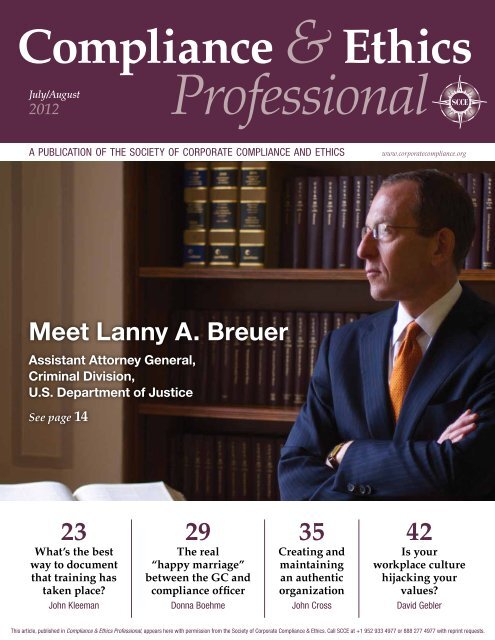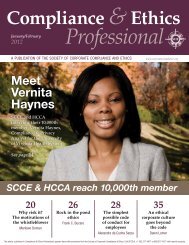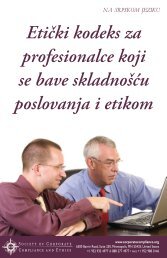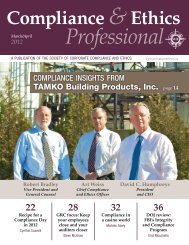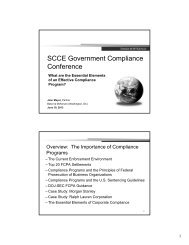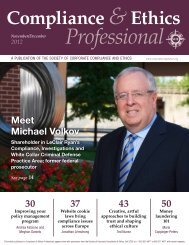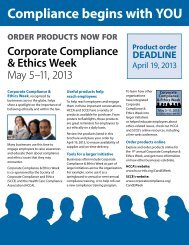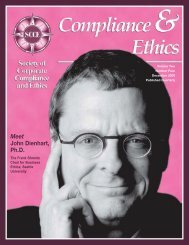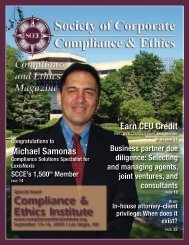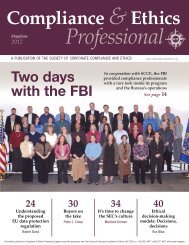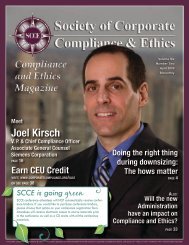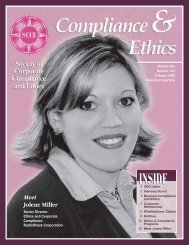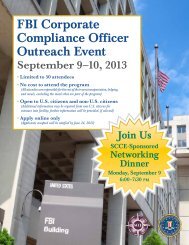Frank J. Navran - Society of Corporate Compliance and Ethics
Frank J. Navran - Society of Corporate Compliance and Ethics
Frank J. Navran - Society of Corporate Compliance and Ethics
- No tags were found...
Create successful ePaper yourself
Turn your PDF publications into a flip-book with our unique Google optimized e-Paper software.
<strong>Compliance</strong> & <strong>Ethics</strong>July/August2012Pr<strong>of</strong>essionala publication <strong>of</strong> the society <strong>of</strong> corporate compliance <strong>and</strong> ethicswww.corporatecompliance.orgMeet Lanny A. BreuerAssistant Attorney General,Criminal Division,U.S. Department <strong>of</strong> JusticeSee page 1423What’s the bestway to documentthat training hastaken place?John Kleeman29The real“happy marriage”between the GC <strong>and</strong>compliance <strong>of</strong>ficerDonna Boehme35Creating <strong>and</strong>maintainingan authenticorganizationJohn Cross42Is yourworkplace culturehijacking yourvalues?David GeblerThis article, published in <strong>Compliance</strong> & <strong>Ethics</strong> Pr<strong>of</strong>essional, appears here with permission from the <strong>Society</strong> <strong>of</strong> <strong>Corporate</strong> <strong>Compliance</strong> & <strong>Ethics</strong>. Call SCCE at +1 952 933 4977 or 888 277 4977 with reprint requests.
y <strong>Frank</strong> J. <strong>Navran</strong>The King is dead.Long live the King!»»To focus exclusively on return on investment, or any other single key success indicator, creates a blind spot.Focus on all the measures <strong>of</strong> long-term, sustainable success.»»Nothing happens in business until somebody buys something, so attracting <strong>and</strong> retaining customers should bea prominent focus <strong>of</strong> any organization.»»Those who use our work product as input to their part <strong>of</strong> the chain <strong>of</strong> events that produce the final “product/service”are our internal customers.»»Our goal should be more than the mere absence <strong>of</strong> complaints. It should be a level <strong>of</strong> service that createsfiercely loyal customers—both internal <strong>and</strong> external.»»Integrity is the key to customer loyalty <strong>and</strong> building trust. Return on Integrity emerges as King. Long Live the King!<strong>Navran</strong>Le Roi est mort, vive le Roi!, was firstdeclared upon the coronation <strong>of</strong>Charles VII following the death <strong>of</strong> hisfather Charles VI in 1422. In France, the declarationwas traditionally made by the Ducd’Uzès, a senior Peer <strong>of</strong> France, as soon asthe c<strong>of</strong>fin containing the remains <strong>of</strong>the previous king descended intothe vault <strong>of</strong> Saint Denis Basilica. Thephrase arose from the law <strong>of</strong> le mortsaisit le vif—that the transfer <strong>of</strong> sovereigntyoccurs instantaneously uponthe moment <strong>of</strong> death <strong>of</strong> the previousmonarch. “The King is dead” is theannouncement <strong>of</strong> a monarch who has justdied. “Long live the King!” refers to the heirwho immediately succeeds to a throne uponthe death <strong>of</strong> the preceding monarch. 1For most <strong>of</strong> my 40+ years <strong>of</strong> experiencein the business world, I have been held to avariety <strong>of</strong> st<strong>and</strong>ards as indexes <strong>of</strong> my success<strong>and</strong> components <strong>of</strong> the formula by which thatsuccess was measured <strong>and</strong> rewarded. I’m fortunatethat for much <strong>of</strong> my corporate careerI was in a staff position where revenue <strong>and</strong>return on investment did not apply to how mysuccess was defined. Yet, in 35 years <strong>of</strong> consulting,nearly every client has been in exactlythe position where their single most significantmeasurement <strong>of</strong> success, the most equal<strong>of</strong> equals, was financial success. Return oninvestment (ROI) was king <strong>and</strong> created a blindspot in nearly every organization. And, formany, the return itself was too <strong>of</strong>ten viewedas being more important than the means bywhich that return was generated.Mid-way through my corporate career, Iwas given the opportunity to manage a group<strong>of</strong> about 75 employees <strong>and</strong> a $5 million budget,serving a customer base <strong>of</strong> about 500,000. Priorto that, my experience in the company hadbeen as a staff manager. In my staff functions,I managed projects with relatively modestbudgets <strong>and</strong> very few, if any, tangible measurableoutcomes. My performance was moreabout the processes I employed <strong>and</strong> my abilityto meet project deadlines, than the more traditional,objective measurements that people inline positions usually faced.But, when I became a line manager, itwas all about the bottom line. The singlemost important measurement for me, <strong>and</strong><strong>Compliance</strong> & <strong>Ethics</strong> Pr<strong>of</strong>essional July/August 2012+1 952 933 4977 or 888 277 4977 www.corporatecompliance.org 55
<strong>Compliance</strong> & <strong>Ethics</strong> Pr<strong>of</strong>essional July/August 2012the people working for me, was work unitsper hour. We knew the cost <strong>and</strong> the marketvalue <strong>of</strong> hours worked. The key was to ensurethat the cost <strong>of</strong> performing our work was sufficientlybelow the price we charged for thatwork to allow us to make a pr<strong>of</strong>it. The bottomline was in fact “the bottom line”—a positivereturn on our investment.There were other objectives. We had toperform the work safely. We had to performthe work properly. But, when you cut to thechase, the motives for safety included both ourcare for the well-being <strong>of</strong> our employees <strong>and</strong>the costs <strong>of</strong> lost time: having an employee onthe payroll being paid <strong>and</strong> producing nothing.And our concern for quality was also informedby concern for the bottom line. If we did not dothe work well, we had to go back <strong>and</strong> do it overor we created a maintenance nightmare thatrequired us to continually go back <strong>and</strong> fix whatwas wrong. And that costs money.The lesson I learned as a manager is that,while I was “leading” people, I was “managing”the bottom line. The investment in people<strong>and</strong> material <strong>and</strong> all the other things we didas leaders was only justified when the moneycoming in exceeded the money going out, sothat we could give an appropriate return toour shareholders on their investments. Returnon investment—in business shorth<strong>and</strong>, ROI.My position as a line manager was thelast time I had that level <strong>of</strong> responsibilityfor direct reporting employees <strong>and</strong> budgetmanagement. My next assignment was as aninternal consultant to the same organization.That led to my current role as an independentconsultant, focused on issues relating to ethics<strong>and</strong> leadership.As an entrepreneur, I still keep an eye onmy costs <strong>and</strong> I still am concerned that revenuesexceed costs. But, <strong>of</strong> necessity, my focushas been on a different aspect <strong>of</strong> how successis measured—customer satisfaction or, to bemore precise, “customer loyalty.” Customersatisfaction may sometimes seem more difficultto quantify <strong>and</strong> evaluate than ROI. Butmy investment in customer loyalty does in factprovide a return, specifically, repeat businessthat lowers my marketing costs, reduces thetime spent trying to develop new business,<strong>and</strong> allows for a more efficient relationshipwith clients where we can spend more timeaddressing the immediate concerns <strong>and</strong> lesstime having to establish a relationship, learneach other’s idiosyncrasies, <strong>and</strong> build trust.To be clear regarding terminology, it maybe useful to borrow some language developedby a colleague <strong>of</strong> mine, Dr. Scott Simmerman. 2Scott was a consultant brought into a projectwhere the client needed some expertise inthe area customer service. Scott’s unique contributionwas to characterize three levels <strong>of</strong>customer service:1. Process <strong>and</strong> h<strong>and</strong>le—which he characterizedas the mechanics <strong>of</strong> a transaction.Consider the behavior <strong>of</strong> a typical checkoutemployee while you go through the process<strong>of</strong> finalizing your purchase. Scan-beep,scan-beep, scan-beep, all the while stuffingyour purchases into the iniquitousplastic bags. When all is said <strong>and</strong> done,the employee may or may not recite theprescribed, “Thank you for shopping at(insert store name here).” My local big boxhardware store has taken “process <strong>and</strong>h<strong>and</strong>le” to a new level. They have installedself-scanning stations where customersscan their selections, swipe their own creditcards, <strong>and</strong> bag their own purchases. Oneemployee can monitor four scanning stations,resulting in reduced costs while stillensuring that customers pay for every itemthat leaves the store.2. Customer service—where “process <strong>and</strong>h<strong>and</strong>le” is supplemented with a modicum<strong>of</strong> politeness, friendliness, <strong>and</strong> courtesy.56 www.corporatecompliance.org +1 952 933 4977 or 888 277 4977
In these situations, customers are <strong>of</strong>ten“greeted” when they enter the store. Rarelydo they have to scan <strong>and</strong> bag their ownpurchases. And, they typically receive asmile <strong>and</strong> a thank you as they leave. Ifcustomers have specific questions, they getanswers. And sometimes, they are even“pointed in the right direction.”3. Customer care—this is Scott’s term for thedeliberate effort to exceed customers’ expectations.This is when the customer receivesmore attention, help, support, information,courtesy, etc. than they expected, thuscreating a new, higher expectation. Thistypically results in acompetitive advantagein the customer’smind, because theyhave received a level <strong>of</strong>attentiveness <strong>and</strong> supportthat differentiatesthat provider.Scott’s research wasclear. Customer care increases customerloyalty by eightfold or more. In other words,customers who believe that they are cared forwill not only go out <strong>of</strong> their way to do businesswith that service provider, but will bragto their friends about how smart they wereto have found such a wonderful place to dobusiness. They are eight times more likely tobecome “repeat” customers.As a result <strong>of</strong> adopting Scott’s model asa foundational element <strong>of</strong> my practice, I haveenjoyed a 90% repeat rate among consulting clients.Simply stated, nine out <strong>of</strong> ten <strong>of</strong> my clientscome back for more. The result is I have muchmore time to do the work that I love, becauseI have to spend so much less time scrabblingaround for new opportunities to do so. I somewhatfacetiously tell colleagues <strong>and</strong> clientsalike that my primary marketing strategy for…the bottom linein most <strong>of</strong> theethics work we docomes downto integrity.the past 15 to 20 years has been to answer thephone when it rings.With that as context, let’s shift the conversationto a redefinition <strong>of</strong> ROI. Over the years,a realization has been emerging that my focusis still squarely on ROI. The difference is thatalthough the acronym remains the same, themeaning is changed. In the ethics world “I”st<strong>and</strong>s for “Integrity.” In 25+ years <strong>of</strong> organizationalconsulting focused on issues relatedto ethics <strong>and</strong> leadership, integrity has beena key consideration in nearly every engagement.Many clients are motivated by practical<strong>and</strong>/or pragmatic considerations, rangingfrom controlling their costs to conforming toexternally imposed st<strong>and</strong>ards(such as the FederalSentencing Guidelines forOrganizations), but thebottom line in most <strong>of</strong> theethics work we do comesdown to integrity.To underst<strong>and</strong> integrity,it can be useful to look atthe root word—integer.An integer is a whole number, a number thatis not a fraction. It is a thing unto itself.Integrity is about us being whole. It isabout us ensuring that our behaviors <strong>and</strong>actions reflect our values <strong>and</strong> beliefs. When webehave in ways that are consistent with whatwe say we believe in <strong>and</strong> what we have taughtothers to expect <strong>of</strong> us, then we are being“whole” <strong>and</strong> acting with integrity. That is notto say that integrity guarantees that what weare doing is always the right or, necessarily,the best thing to do; but we are being consistent<strong>and</strong> predictable, a known quantity.Several years ago, when I was a line manager,one <strong>of</strong> my colleagues was a gentlemanwith whom I had daily interactions. He wasuniversally seen as being an SOB. In fact, thatreputation was so firmly entrenched that one<strong>of</strong> my employers refer to him as a “spherical<strong>Compliance</strong> & <strong>Ethics</strong> Pr<strong>of</strong>essional July/August 2012+1 952 933 4977 or 888 277 4977 www.corporatecompliance.org 57
<strong>Compliance</strong> & <strong>Ethics</strong> Pr<strong>of</strong>essional July/August 2012SOB.” A sphere, as you may recall from highschool geometry, is the only figure that looksexactly the same no matter which directionyou might view it from. Shine a light on asphere from any angle <strong>and</strong> the shadow isalways round. And that’s the way it was withBill. He was an SOB no matter how you lookedat him. So, to be certain, consistency is not, in<strong>and</strong> <strong>of</strong> itself, a virtue, but ethical consistency is.This little bit <strong>of</strong> reflection has led meto conclude that, at least in my world, ROIis still king, but for me the acronym nowreads “Return On Integrity.” For 25 years,the bottom line <strong>of</strong> the work I do with my clientshas only indirectly…work done ethically,with integrity, has apositive impact on thefinancial performance<strong>of</strong> every legitimatebusiness enterprise.been about their financialreturn. The directfocus was on raisingthe levels <strong>of</strong> integrity intheir organization. Wewere working together toestablish <strong>and</strong> sustain thesystems, processes, <strong>and</strong>leadership necessary toensure that everything they said <strong>and</strong> did contributedto increasing integrity <strong>and</strong> the ethicalwholeness within their organizations.Lest that sound unbusiness-like, let me tiethe “ethics” ROI to the more common financialROI. Although I do not contend that thereis a certain, guaranteed correlation betweenintegrity <strong>and</strong> pr<strong>of</strong>itability, I do believe thereare several arguments that support the thesisthat work done ethically, with integrity, has apositive impact on the financial performance<strong>of</strong> every legitimate business enterprise.For those <strong>of</strong> us in the business world, nothinghappens until somebody buys something.That something may be a tangible productor an intangible service or, more typically,a combination <strong>of</strong> both. Irrespective <strong>of</strong> whatthe customer buys, there are promises thataccompany that purchase. If those promisesare not met, the customer will not be satisfied<strong>and</strong>, given the opportunity, will choose to dobusiness with your competitors in the future.If those promises are met or exceeded, thenScott’s three levels <strong>of</strong> customer service comeinto play.At Level 1, the customer receives everythingthey were promised—nothing more,nothing less. They have nothing to complainabout. Neither do they have anything to feelgreat about. Nothing to brag to their friendsabout except, perhaps, the small price paid.The transaction was successfully completed.It is not that different from putting my moneyin a vending machine. I pull the lever. I get theproduct. These customerswill go to any reasonablyconvenient provider wherethe product or service canbe purchased for the sameprice or less.At Level 2, the customerreceives everything theywere promised, accompaniedby polite, friendly,<strong>and</strong> courteous service. I go into the store. Mydesired product is easy to find. I select it, payfor it, <strong>and</strong> the clerk smiles <strong>and</strong> says, “Thankyou” or “Have a nice day” <strong>and</strong> I leave. I gotthe product. The product was as expected.And the experience was unexceptional, notunpleasant, just unexceptional. These customerswill go to any provider who promisesto provide that same product or service, at acompetitive price, whenever the need arises,without a second thought.At Level III, the customer goes into theestablishment, is greeted by name, welcomedback with a smile, <strong>and</strong> asked howthey might be helped. They are given direction,guidance, or whatever other help theymight need to make a confident, informeddecision. The person serving them is attentivewithout being intrusive. They are <strong>of</strong>feredsuggestions on how to optimize the value58 www.corporatecompliance.org +1 952 933 4977 or 888 277 4977
<strong>of</strong> their purchase, realize all <strong>of</strong> the potentialvalue, <strong>and</strong> reminded that their patronage isappreciated. They leave feeling better for theexperience. They feel good about the purchase.They feel good about the interaction,if for no reason other than it was better thanit might have been had they gone somewhereelse for the same product or service. Thosebecome loyal customers. The research suggeststhat they will deliberately drive pastseveral competitors to get back to you becauseyou make the process more than merelypleasant. You make it about them. Level IIIcustomers become loyal customers. And, onaverage, brag to eight others about how smartthey were to do business with you.As a consultant focused on ethics <strong>and</strong> leadership,Scotts’ model played two roles in thematuring <strong>of</strong> my practice. The obvious first levelis that Scott taught me important lessons abouthow I need to treat my clients in order to earntheir loyalty. I continually try to apply thoselessons, <strong>and</strong> my customer repeat rate suggeststhat I am somewhat successful in doing so. Thesecond is the realization that, given my focuson organizational ethics, customer service is an“ethical model.” It builds on the notion <strong>of</strong> integrity.It builds on the concept <strong>of</strong> keeping <strong>and</strong>exceeding one’s promises—whether explicit orimplicit, contractual or understood—irrespective<strong>of</strong> their legal enforceability.In the majority <strong>of</strong> my ethics work, we findintegrity to be an issue. Integrity is almostalways either directly or implicitly a core value<strong>of</strong> my clients’ organizations. It is understood ascontributing to trustworthiness. It is the fulfilling<strong>of</strong> promises. It is the expectation that onewill do what they say what they will do, everytime, without fail, without compromise, reliably,predictably, <strong>and</strong> to the best <strong>of</strong> their ability.It is an expectation I foster in my clients in twodirections: an expectation <strong>of</strong> how they shouldlook for me to act, <strong>and</strong> a strong recommendationregarding how they should act towards others.A significant number <strong>of</strong> my clients arepeople who have formal assigned responsibilitiesfor the management <strong>of</strong> an ethics initiative,or some portion there<strong>of</strong>, within their organizations.Many <strong>of</strong> these people either report toor carry the title <strong>of</strong> ethics <strong>of</strong>ficer or ethics <strong>and</strong>compliance <strong>of</strong>ficer. Some have legal training.Others are from the Human Resources field.And many are from staff or line managementpositions with limited or no formal training inethics as it applies to organizational managementor effectiveness.Irrespective <strong>of</strong> their background or levelwithin the organization, these ethics <strong>and</strong>compliance <strong>of</strong>ficers have some things incommon. Most frequently they are taskedwith responsibilities for communicating theethical st<strong>and</strong>ards <strong>of</strong> the organization, ensuringthat employees are both aware <strong>of</strong> <strong>and</strong>capable <strong>of</strong> meeting those st<strong>and</strong>ards, <strong>and</strong>dealing with those occasional circumstanceswhere the st<strong>and</strong>ards are either disregardedor violated.For line managers to be successful, thefunction they represent must be trusted by theemployees they are tasked to oversee <strong>and</strong> bythe leadership who are ultimately responsiblefor the end results. Going back to the earlierobservation that trust is the residue <strong>of</strong> promisesfulfilled, it is useful to ask, “What are theexplicit <strong>and</strong> implicit promises <strong>of</strong> an <strong>Ethics</strong>Office?” I would suggest that the single mostsignificant promise is integrity.The word “integrity” is derived from thesame root as the word “integer.” In mathematics,an integer is a whole number, a thingcomplete within itself. Integrity has to dowith “wholeness.” Bringing this conversationback to Earth, we can simply say that integrityis the basis for trust. It is the belief that youwill get what you expect, <strong>and</strong> you will getall <strong>of</strong> what you expect. The promises that aremade will be kept. Thus trust, the residue <strong>of</strong>promises fulfilled, is the product <strong>of</strong> integrity.<strong>Compliance</strong> & <strong>Ethics</strong> Pr<strong>of</strong>essional July/August 2012+1 952 933 4977 or 888 277 4977 www.corporatecompliance.org 59
<strong>Compliance</strong> & <strong>Ethics</strong> Pr<strong>of</strong>essional July/August 2012I’ve come to believe over the past 40 years inbusiness that trust is the single most powerful<strong>and</strong> significant commodity. If I am not trusted,you’ll only do business with me under duress.If I am trusted, you will seek out the opportunityto do business with me if <strong>and</strong> when theproduct or service I provide meets a need. Asan internal manager who provides staff servicesto a captive audience, I was never told thatmy goal was to build trust in my function <strong>and</strong>in me, but it was. As an external resource, I didnot need to be told that my goal was to buildtrust with clients if I was to be successful bothin the short-term <strong>and</strong> in the long run. I hadalready learned that lesson. Ultimately what Isell is trust, <strong>and</strong> trust presupposes integrity. Ifmy clients do not believe I have integrity—thatI will meet or exceed all expectations <strong>and</strong> keepall promises—they will not trust me <strong>and</strong> willnot continue to be my clients.ROI—Return on Investment—is a result.It is measured <strong>and</strong> monitored as an indicator<strong>of</strong> a business’s success. It is an indicator <strong>of</strong>economic success.ROI—Return on Integrity—is also a result.It is perhaps more difficult to measure <strong>and</strong>monitor but, in my experience, is an even moresignificant indicator <strong>of</strong> a business’s success. ThisROI is a long-term indicator <strong>of</strong> economic successto come. If you individually (as a function or asa company) are trusted, you will be more successful,all things being equal, than if you arenot trusted. For my colleagues in the business,for those with internal ethics management <strong>and</strong>leadership responsibilities, <strong>and</strong> for those whoare held to <strong>and</strong>/or hold themselves to high ethicalst<strong>and</strong>ards, integrity is not an option. It is aprecondition for everything we do.Integrity is not a short-term indicator. It is alifelong pattern <strong>of</strong> a behavior <strong>and</strong> perceptions.It contributes to our individual <strong>and</strong> collectivesuccess in every aspect <strong>of</strong> our lives including,but not limited to, business. My simple propositionis that nothing matters more to you as aperson, as an employee, as a leader, as an example,than the integrity you demonstrate <strong>and</strong> thatyou instill in <strong>and</strong> require <strong>of</strong> those around you.It doesn’t matter if you are the chairman<strong>of</strong> the board, a member <strong>of</strong> the board, aninhabitant <strong>of</strong> the C-suite, a manager, a leader,or an employee. Your integrity defines you.Integrity is the basis for whatever success youwill achieve, whatever respect you will earn,<strong>and</strong> whatever impact you will have on thosearound you. If you keep your focus on integrity,it may not guarantee your success. Doingyour job well will guarantee your success. Afocus on integrity will contribute to that successin that people will know that they cantrust you, trust what you say to be true, <strong>and</strong>trust the promises you make will be kept.With integrity, you have laid the groundworkfor trust. People will believe that you willkeep your promises <strong>and</strong> do what you do as wellas you are able. And you will do all this, irrespective<strong>of</strong> job title, job responsibilities, level, orany other tangible aspect <strong>of</strong> your work.There is no greater investment you canmake in your own personal success, <strong>and</strong> that<strong>of</strong> those you lead or the company you serve,than to bring the highest levels <strong>of</strong> integrity tothe work you do. For that reason, I propose thatROI be understood to mean Return on Integrity.It is time to overthrow Return on Investmentas the supreme goal. Return on investment is anatural byproduct <strong>of</strong> an organization <strong>and</strong> leaderswithin that organization who operate froma base <strong>of</strong> integrity in pursuit <strong>of</strong> their goals. Thebottom line is simply the bottom line. It is thegoal. Integrity is the path. Integrity is King.Le Roi est mort, vive le Roi!, The King is dead.Long live the King. Long live integrity! ✵1. Wikipedia: http://en.wikipedia.org/wiki/The_King_is_dead._Long_live_the_King2. www.squarewheels.com<strong>Frank</strong> J. <strong>Navran</strong> (frank @ navran.com) is the Founder <strong>and</strong> PrincipalConsultant <strong>of</strong> <strong>Navran</strong> Associates. <strong>Frank</strong> has worked with clients in morethan twenty countries <strong>and</strong> has authored five books <strong>and</strong> more than twohundred articles <strong>and</strong> book chapters.60 www.corporatecompliance.org +1 952 933 4977 or 888 277 4977


